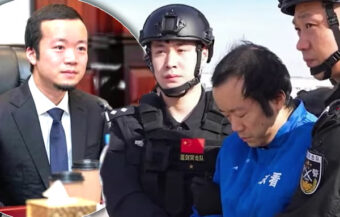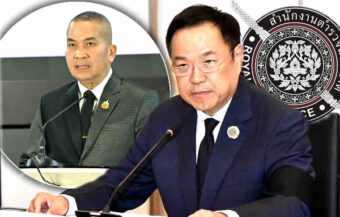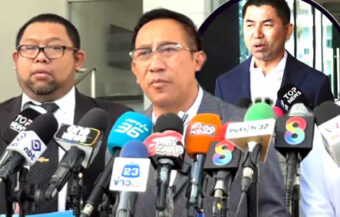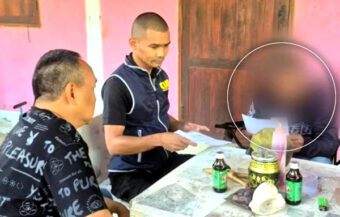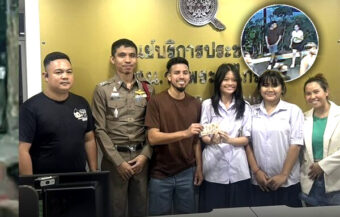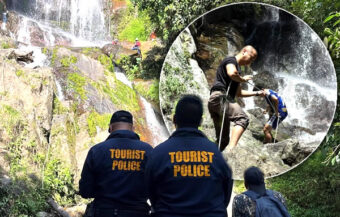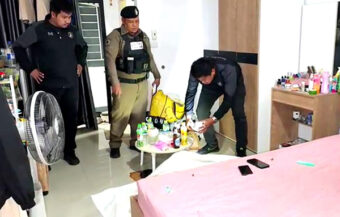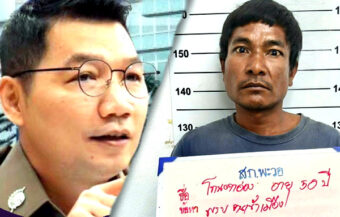Thai soldier loses leg after stepping on a landmine during routine patrol near the Thai-Cambodian border in Ubon Ratchathani. The blast was at a former battlefield hotspot littered with hidden explosives. Two others suffered minor injuries; tensions remain high.
A Thai soldier has lost his leg after triggering a landmine during a border patrol near Cambodia. The blast, caused by an old buried device, struck in the Hill 481 area of Ubon Ratchathani Province—a known hotspot littered with wartime explosives. The victim, Private First Class Thanapat Huiwan, was part of a 14-man unit on a routine mission as tensions in the area remain heightened. Two other soldiers suffered less severe injuries.
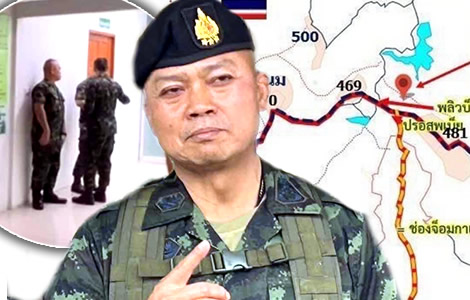
Thai armed forces confirmed on Wednesday night that one soldier had lost a leg after a landmine explosion. The incident occurred during a routine border patrol near Cambodia. It took place on Hill 481 in Nam Yuen District, Ubon Ratchathani Province.
The wounded soldier was Private First Class Thanapat Huiwan. He was among 14 personnel from the Suranaree Task Force. They were patrolling a known danger zone along the Thai-Cambodian border.
Importantly, the explosion happened at coordinates WA 220 861. This location lies within a former combat zone. Landmines from past conflicts still remain buried across the area. According to military officials, such devices are difficult to detect and remove.
Patrol unit made up of reconnaissance, rapid deployment, and engineering soldiers carried out routine sweep
The patrol group was made up of two reconnaissance officers, six rapid deployment force (RDF) soldiers, and six engineers. They had departed from the Morakot Operations Base earlier that day. Their mission was a standard security sweep through a forested border area.
Suddenly, a member of the team triggered a hidden explosive. The blast left three soldiers injured. Private Thanapat was the most seriously hurt. He suffered a devastating leg injury that required immediate evacuation.
In addition, Sergeant Patipat Silasak and Private First Class Nattawut Srikhem were wounded by the explosion. Both men complained of chest pain and ringing in the ears. Their injuries were described as non-life-threatening.
Medical personnel rushed to the scene. First aid was administered in the field. Soon after, the injured were transported to Nam Yuen Hospital for initial care. Because of Thanapat’s critical condition, he was later airlifted to Saraphithiprasong Camp Hospital.
Emergency surgery results in amputation while military commanders visit injured soldiers at hospital
There, doctors performed emergency surgery. Unfortunately, they had no choice but to amputate Thanapat’s leg. As of Wednesday night, his condition remained serious. However, doctors said he was stable and under close observation.
Meanwhile, Maj. Gen. Sompop Pharawet, commander of the Suranaree Task Force, visited the injured. He arrived at the hospital around 6:00 p.m. to offer support. Col. Sala Thapthaworn, hospital director, briefed him on each soldier’s condition.
Lt. Gen. Boonsin Phadklang, commander of the 2nd Army Region, later confirmed details in a press briefing. He stated that the patrol team encountered an old landmine buried in a former battlefield. These devices were likely left during clashes in earlier decades.
He added that patrols in this area are frequent but still dangerous. In fact, clearance teams have been working in the region for years. However, landmines remain hidden due to erosion and shifting soil.
Hill 481 is a hazardous former battlefield. Unexploded ordnance and buried landmines pose a danger
Notably, Hill 481 has a long history of military activity. It was once the scene of intense conflict. As a result, large numbers of unexploded ordnance (UXO) remain in the region.
Although the army uses detection equipment, some mines are too deeply buried. Others are covered by thick vegetation or debris. This makes the process of clearing the area slow and extremely hazardous.
Following the explosion, army engineers and explosive ordnance disposal (EOD) teams were dispatched. Their task was to inspect the site and search for additional threats. Patrol routes in the area are now under review.
Despite the risk, the military has not suspended patrols. Instead, commanders say additional safety measures will be taken. More specialised detection units may also be deployed to support field teams.
Military vows to continue patrols despite risks and plans to deploy more specialised detection units
In the meantime, tension continues to rise along the Thai-Cambodian border. According to local officials, there have been recent confrontations involving Thai troops and Cambodian tourists. Many of these incidents occurred near contested historical sites.
While none have turned violent, the atmosphere remains tense. Border officials are increasing security at key locations. They are also asking civilians to avoid unmarked paths and follow all warnings.
A senior officer, speaking anonymously, noted a rise in unauthorised movement across the border. “We are seeing more tourists stray into danger zones,” he said. “They may not realise the area is still mined.”
The military has issued repeated warnings to avoid restricted areas. Nevertheless, some visitors continue to ignore signs and fences.
Border officials increase security and warn tourists to avoid danger zones amid rising unauthorised crossings
So far, no civilians have been injured. However, commanders worry that the next accident could involve a tourist or local resident. Efforts are underway to increase public awareness of the danger.
Meanwhile, families of the injured soldiers have been notified. Military support teams are providing them with assistance. Soldiers who were on the patrol are also being debriefed and given time to recover.
Officials from the Ministry of Defence are expected to visit the region later this week. They will assess the need for further demining operations and support for local units.
As of late Wednesday, Thanapat remained in recovery at Saraphithiprasong Camp Hospital. Doctors say the next 48 hours will be critical for him. The military hospital is providing round-the-clock care.
Families supported, while recovery efforts continue while ministry plans further demining inspections
The two other injured soldiers are also being kept under observation. However, both are expected to make full recoveries.
Although no immediate disciplinary or operational changes were announced, a full investigation is underway. The findings will help inform future patrol protocols and mine-clearance strategies.
Martial law declared in border areas with Cambodia as military takes command of Thailand’s tense standoff
Helicopter emergency landing as Cambodian border security is tightened near Poipet amid rising tensions
Khmer soldier killed in deadly gunfire between Thai and Cambodian armies near Ubon Ratchathani
For now, the army has urged caution. “These soldiers were performing their duty in a dangerous area,” said Lt. Gen. Boonsin. “Their bravery must be recognised, but we must also prevent this from happening again.”
While the military continues to secure the border, officials warn the public not to underestimate the threat. Mines, even decades old, remain deadly. The recent incident is a sharp reminder of the region’s violent past—and of the risks still buried beneath the soil.
Join the Thai News forum, follow Thai Examiner on Facebook here
Receive all our stories as they come out on Telegram here
Follow Thai Examiner here
Further reading:
Dangerous impasse between Thailand and Cambodia as PM rules out International Court of Justice (ICJ)
Hun Manet confirms Cambodia ultimately may decide to send border dispute with Thailand to the Hague
Khmer soldier killed in deadly gunfire between Thai and Cambodian armies near Ubon Ratchathani
Thaksin to address state board on drug suppression despite howls of protest from human rights groups
Health Minister Somsak launches regulatory blitz to outlaw non-medical cannabis use within 40 days





